
Jean-Luc Godard was a French and Swiss film director, screenwriter, and film critic. He rose to prominence as a pioneer of the French New Wave film movement of the 1960s, alongside such filmmakers as François Truffaut, Agnès Varda, Éric Rohmer and Jacques Demy. He was arguably the most influential French filmmaker of the post-war era. According to AllMovie, his work "revolutionized the motion picture form" through its experimentation with narrative, continuity, sound, and camerawork.

Alphaville: une étrange aventure de Lemmy Caution is a 1965 French New Wave tech noir film written and directed by Jean-Luc Godard. It stars Eddie Constantine, Anna Karina, Howard Vernon and Akim Tamiroff. The film won the Golden Bear award of the 15th Berlin International Film Festival in 1965.
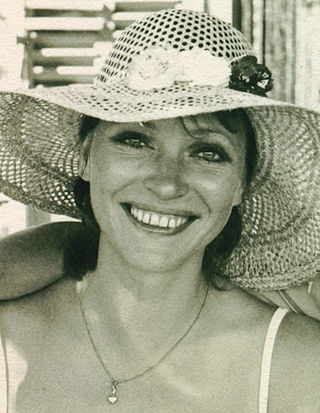
Anna Karina was a Danish-French film actress, director, writer, model, and singer. She was an early collaborator of French New Wave director Jean-Luc Godard, her first husband, performing in several of his films, including The Little Soldier (1960), A Woman Is a Woman (1961), My Life to Live (1962), Bande à part, Pierrot le Fou (1965), and Alphaville (1965). For her performance in A Woman Is a Woman, Karina won the Silver Bear Award for Best Actress at the Berlin Film Festival.
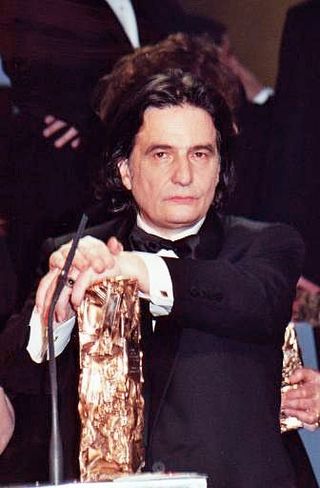
Jean-Pierre Léaud, ComM is a French actor best known for being an important figure of the French New Wave and his portrayal of Antoine Doinel in a series of films by François Truffaut, beginning with The 400 Blows (1959). He has worked with Jean-Luc Godard, Agnès Varda, and Jacques Rivette, as well as other notable directors such as Jean Cocteau, Pier Paolo Pasolini, Bernardo Bertolucci, Catherine Breillat, Jerzy Skolimowski, and Aki Kaurismäki.

Breathless is a 1960 French New Wave crime drama film written and directed by Jean-Luc Godard. It stars Jean-Paul Belmondo as a wandering criminal named Michel, and Jean Seberg as his American girlfriend Patricia. The film was Godard's first feature-length work and represented Belmondo's breakthrough as an actor.

The New Wave, also called the French New Wave, is a French art film movement that emerged in the late 1950s. The movement was characterized by its rejection of traditional filmmaking conventions in favor of experimentation and a spirit of iconoclasm. New Wave filmmakers explored new approaches to editing, visual style, and narrative, as well as engagement with the social and political upheavals of the era, often making use of irony or exploring existential themes. The New Wave is often considered one of the most influential movements in the history of cinema.
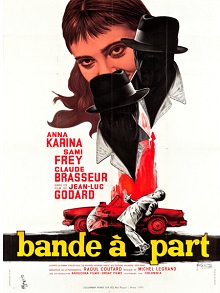
Bande à part is a 1964 French New Wave film directed by Jean-Luc Godard. It was released as Band of Outsiders in North America; its French title derives from the phrase faire bande à part, which means "to do something apart from the group". The film is about three people who commit a robbery. It received positive critical reviews, and its dance scene has been referenced several times in popular culture.
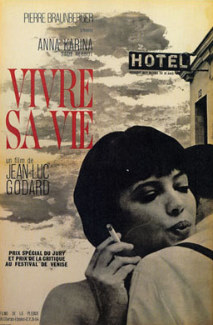
Vivre sa vie is a 1962 French New Wave drama film written and directed by Jean-Luc Godard. The film was released in the United States as My Life to Live and in the United Kingdom as It's My Life.
The Nouvelle Droite, sometimes shortened to the initialism ND, is a far-right political movement which emerged in France during the late 1960s. The Nouvelle Droite is the origin of the wider European New Right (ENR). Various scholars of political science have argued that it is a form of fascism or neo-fascism, although the movement eschews these terms.

Weekend is a 1967 postmodern black comedy film written and directed by Jean-Luc Godard, based on Julio Cortázar's short story "La autopista del Sur". It stars mainstream French TV stars Mireille Darc and Jean Yanne. Jean-Pierre Léaud, comic star of numerous French New Wave films, including François Truffaut's The 400 Blows (1959) and Godard's earlier Masculin Féminin (1966), appeared in two roles. Raoul Coutard served as cinematographer.

Eddie Constantine was an American singer, actor and entertainer who spent most of his career in France. He became well-known to film audiences for his portrayal of secret agent Lemmy Caution and other, similar pulp heroes in French B-movies of the 1950s and 1960s.

Jacques Perrin was a French actor and film producer. He was occasionally credited as Jacques Simonet.

Les Rita Mitsouko were a French pop rock group formed by Fred Chichin and Catherine Ringer. The duo first performed as Rita Mitsouko at Gibus Club in Paris in 1980. They went on to become one of the most acclaimed musical acts in France. "Marcia Baila", their debut single produced by Conny Plank, went to number 2 in the French singles chart in 1984. They then started a collaboration with producer Tony Visconti on two albums: the No Comprendo (1986) and Marc & Robert (1988). "Singing in the Shower", sung as a duet with Sparks, was a commercial success in France and was then heavily played on US dance radio stations in 1988. Iggy Pop also collaborated with them on 1993's Système D, duetting with Ringer on "My Love Is Bad".

Catherine Ringer is a French singer, songwriter, composer, multi-instrumentalist, dancer, choreographer, actress, former pornographic performer, and co-founder of the pop rock group Les Rita Mitsouko. She is the daughter of French artist Sam Ringer. She is also the lead vocalist for Plaza Francia Orchestra where she performs with Eduardo Makaroff and Christoph H. Müller, formerly of Gotan Project.

Passion is a 1982 film by Jean-Luc Godard, the second full-length film made during his return to relatively mainstream filmmaking in the 1980s.
Lemmy Caution is a fictional character created by British writer Peter Cheyney (1896–1951). Caution was first portrayed as a Federal Bureau of Investigation (FBI) agent, and in later stories as a private detective.
For Ever Mozart is a 1996 feature film directed, written and edited by Jean-Luc Godard. The film's title is a bilingual pun intentionally meant to sound like "Faut rêver Mozart". The film was selected as the Swiss entry for the Best Foreign Language Film at the 70th Academy Awards, but was not accepted as a nominee.
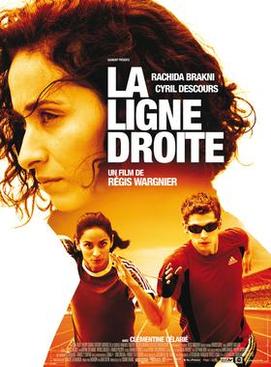
La Ligne droite is a 2011 French drama film co-written and directed by Régis Wargnier which focuses on the sport of blind running. It stars Rachida Brakni, Cyril Descours, Clémentine Célarié, and Seydina Baldé. The film was given a limited release on 9 March 2011.
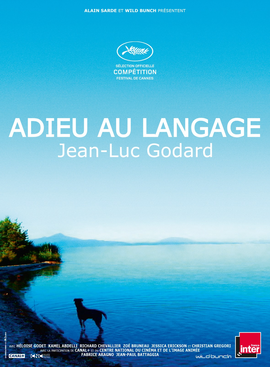
Goodbye to Language is a 2014 French-Swiss narrative essay film written and directed by Jean-Luc Godard. It stars Héloïse Godet, Kamel Abdeli, Richard Chevallier, Zoé Bruneau, Jessica Erickson and Christian Grégori and was shot by cinematographer Fabrice Aragno. It is Godard's 42nd feature film and 121st film or video project. In the French-speaking parts of Switzerland where it was shot, the word "adieu" can mean both goodbye and hello. The film depicts a couple having an affair. The woman's husband discovers the affair and the lover is killed. Two pairs of actors portray the couple and their actions repeat and mirror one another. Godard's own dog Roxy Miéville has a prominent role in the film and won a prize at the Cannes Film Festival. Like many of Godard's films, it includes numerous quotes and references to previous artistic, philosophical and scientific works, most prominently those of Jacques Ellul, Aleksandr Solzhenitsyn and Mary Shelley.
The Federation of Nationalist Students was a French far-right student society active between 1960 and 1967, founded by François d'Orcival and others, soon joined by Alain de Benoist as a lead journalist.
















